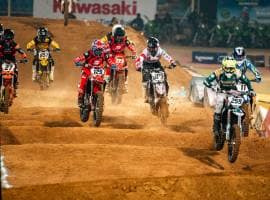The brutal truth: CS Santosh on life after his fourth Dakar Rally
I'm not going to sit here and lie and tell you that I'm a fighter."
It's no coincidence that CS Santosh, who has only just made it back to Bangalore after competing in his fourth Dakar, uses the word 'fighter'. If you've spoken to him often enough, you'll know that he chooses his words deliberately. There are no off the cuff remarks, instead, there is considerable contemplation before he allows each thought to go forth into the world. So, when he tells me that he believes calling himself a fighter would be dishonest, I know that he means it.
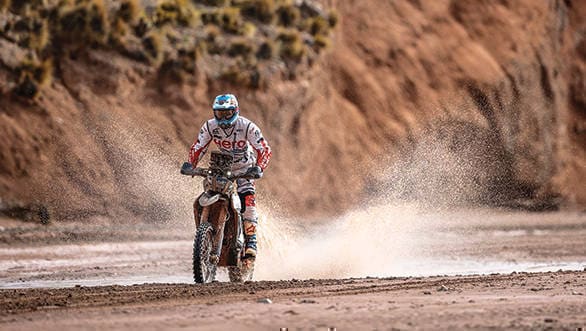 CS Santosh ended his fourth attempt at the Dakar Rally in 35th position - his best finish at the event to date.
CS Santosh ended his fourth attempt at the Dakar Rally in 35th position - his best finish at the event to date.
"People look at me and they say, 'Look at this guy, he never gives up.' But I gave up at the Dakar three times. I'm not exactly what people think I am. It's complex, like the Dakar " he trails off.
But how can someone who has just completed that most gruelling of all rallies - that too for the third time, no less - believe that he's given up? It's a complicated matter. To understand this one needs to understand the inner workings of Santosh's mind, and he's just guarded enough not to allow a pesky journalist in beyond a certain point. Even so, one gets the sense that it's partly because of the fact that he has rather high standards that he sets himself. Standards that come from knowing that there's something within him that he has yet to deliver. And standards that also come from having heroes that he looks up to. Individuals like Mike Tyson and Tupac Shakur, who while eccentric, have also proven to be terribly accomplished in their own fields. Like he said, it's complex.
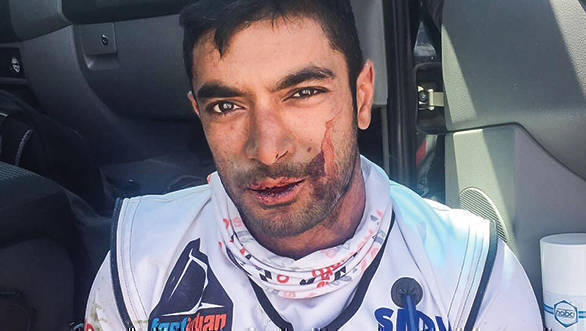 Here he is looking more than just slightly worse for the wear after one of the more major punches the 2018 Dakar threw at him.
Here he is looking more than just slightly worse for the wear after one of the more major punches the 2018 Dakar threw at him.
Santosh says he can't remember what stage he was riding when it happened. The crash. The one that left him with a blood-streaked face, and swollen lips. Since he says it was the same stage on which Adrien van Beveren crashed I conclude it was Stage 10. He'd had a pretty good run as the rally progressed from Salta to Belen even passing a few riders, like Olivier Pain who would finish the Dakar 29th, along the way. At one point, Santosh says he looked down at his roadbook and saw a double caution marked out along a 4km piste section. But then he made the mistake of reading the terrain with his eyes, and not relying on the roadbook. After all there was just 15km to go before the neutralisation. The memories are then a little hazy.
"After this crash, when I came to my senses, I thought the Dakar was over again," Santosh says. 'Again', because he had already had a massive crash earlier in the rally, which left him with an injured leg and a limp. This crash, however, was worse. The impact had done his head in a little - in addition to the puffed up face and blood everywhere he had to come to terms with the fact that he couldn't figure out which direction he needed to head in. His Hero MotoSports Team Rally RR450 was pretty beat up too - the spokes were broken, as were various other crucial bits and bobs. And, worst of all, he says, was the fact that "the wheel was locked and wasn't turning."
"Not giving up is getting up and saying let's do this I want to make it to the finish. A fighter's attitude. When I got up I just said 'I don't think I'm going to make it'. It's one of those things ." he says, suddenly growing quiet. Perhaps the reason this bothers him so much is because it was in stark contrast to his attitude in his first attempt at the Dakar in 2015. "In my first Dakar, no matter how many times I crashed, I got up and thought, 'No, I'm going to f***ing finish this thing.'" Well, it's a hard and punishing way to realise that life isn't always as simple as the lyrics to a Chumbawamba song.
As fate would have it, though, when Santosh was there, knocked down and assuming the worst given that a couple of riders rode right past him, a third rider chose to stop and help. He picked the Hero MotoSports RR450 up, and kicked it a little in a bid to get it going again. It is to this rider that Santosh owes a debt of gratitude. Thanks to him, he managed to move on and make it to the neutralisation, where the team was waiting with their Sprinter loaded with equipment, and trusty mechanic Filipe Barbosa who managed to fix the bike.
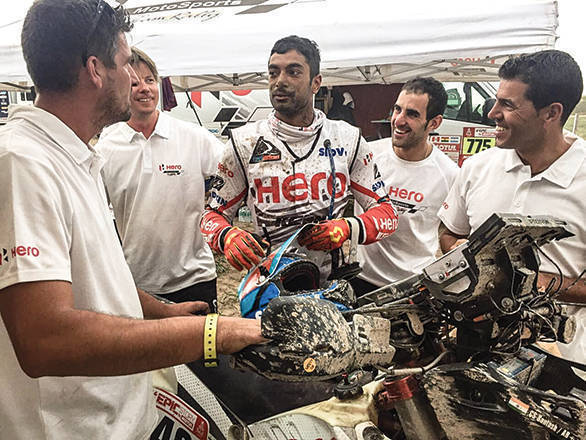 The Hero MotoSports Team Rally crew and team-mate Oriol Mena look on with amusement at a slightly muddy Santosh whose only just made it back to the bivouac in one piece.
The Hero MotoSports Team Rally crew and team-mate Oriol Mena look on with amusement at a slightly muddy Santosh whose only just made it back to the bivouac in one piece.
"I think life had other plans for me," Santosh says thinking back to that time. Even though he wanted to give up, or thought he simply couldn't continue, it seemed that giving up wasn't an option at all. Despite the fact that with every crash, his energy was waning, and the terrain was ruthless, it would appear that he was destined to get to the finish line. "The way I crashed really is a testament to what luck can do for a man," he says before describing the crash, the memory of which seems to have become clearer over the course of our conversation. "I had fifth gear pinned and I hit a river wash and there were rocks everywhere. It could have gone either which way for me," he continues. But when, at that point, he managed to get the motorcycle going again and continued on the rally, he says he had a sense that he'd make it to the end of the Dakar after all. Just as one does not survive life's hard knocks with no good reason, one does not survive the blows the Dakar deals out, unless one is meant to make it to the finish line. In this sense both life and the Dakar are slightly twisted in their ability to be cruel and kind all at once.
Speaking of cruel - that the Dakar is tough, gruelling, demanding, exhausting and excruciating is pure fact. That it was in its 40th edition, however, meant that the event had gone up a few notches in terms of just how terrifying it was, which is why the word Santosh keeps repeating - brutal - is apt. "I think in their minds they visualised the 40th edition as something that had to be really tough. And it turned out a lot tougher than they envisioned as well." By the time that Santosh was getting to the neutralisation after that crash, several front runners in the Moto class had fallen by the wayside. Sam Sunderland retired with an injured back, Adrien van Beveren had a broken collarbone and other assorted injuries, and soon Joan Barreda Bort would retire with an injured knee. But, the retirement that had the most impact on Santosh was that of his team-mate. "I never expected Joaquim (Rodrigues) to crash on the first day. That guy knows how to handle pressure. And he's done it for many years - in motocross and all that. I didn't think he'd be the first guy to go out," he says.
For Santosh the 2018 edition of the Dakar became not so much about riding his very best, as much as it became about survival. "You're so exhausted because of the trauma of having to go through that (the crashes). And you're surviving - not riding - you're surviving the stage. You're in survival mode," Santosh says. After each stage that he crashed, he'd receive medical attention. But the crash itself would mean that his whole body was aching the next day, which meant that he wasn't able to ride 100 percent. "I had two days like that, which means I lost four days. The day I crashed and the next day. It's tough like that," he says. I can't help but think that's something of an understatement.
While being in survival mode might have helped Santosh get to the finish line, his reaction to finishing his third Dakar was somewhat mellow. "When I saw the finish, I saw people were crying, but I was like 'I don't feel anything'". This is because he believes that he's no longer just there to make up the numbers and get to the finish line. "I had a different vision in my head. I've done it three times for sure, but I'm going there to prove a point and that point hasn't been made as yet," he says. Which means the sense of accomplishment is somewhat bittersweet. "This year I was at a place where I knew if I jumped over to the other side, my performance was going to go in the right direction - upwards. I was sitting on that fence and I had a peek at what it's going to take for me to perform," he says of the first two stages where he finished 13th and 29th. But it's given him something of a confidence boost, despite the disappointment. "I know for sure that next year I'll be in the twenties. I can tell you that today. I'm really confident in my own ability to do what I have to do next year," he says.
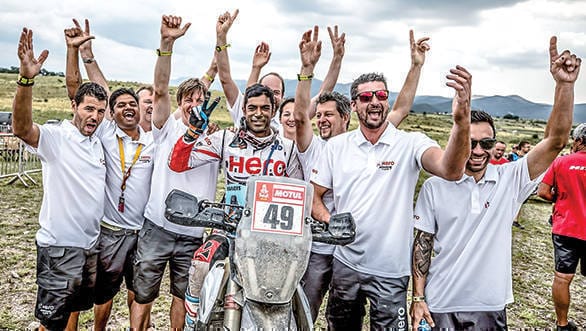 Celebrations are in order - the Dakar 2018 is done and dusted. Crashes, difficulties and whatever else it threw their way are now in the past.
Celebrations are in order - the Dakar 2018 is done and dusted. Crashes, difficulties and whatever else it threw their way are now in the past.
But breaking into the top 20 will require work. After all, the riders at the front of the pack often appear superhuman, something Santosh is acutely aware of. "When you look at all these guys, they're like gods," he says. "When you ride, you never see them," he says because the guys in the top 20 are often far ahead of the rest. "You just see how fast you're going yourself, and then you imagine the speeds that they're doing, which is unrealistic," he continues. Then, at the end of the day's riding, though, you get to see them without helmets and riding gear in the bivouac. "When you see them in reality - they're men, just like you," Santosh says.
Which is why when Santosh was riding in the dunes in Peru during the early stages of the rally, mixing it up with the likes of Kevin Benavides and finishing ahead of Toby Price, a certain confidence came in. It brought with it the silver lining in an otherwise cloudy Dakar. "The high point for me is knowing that I have that potential. To be the guy that I imagine myself to be. That's what I take home with me. Just thinking about everything that I did this Dakar - all the issues that I had, but I still achieved what I did. I know next year it will be a lot different."
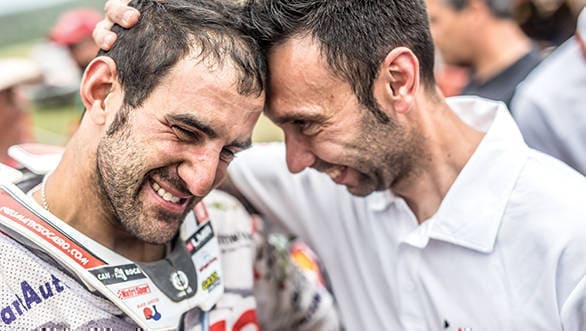 Oriol Mena and a crew member celebrate his seventh place finish at the event. The Spaniard won the event's rookie category.
Oriol Mena and a crew member celebrate his seventh place finish at the event. The Spaniard won the event's rookie category.
And in order to ensure that next year will be different, he believes he needs a lot of time on the bike. The physical fitness, he's already managed to tackle. The navigation seems to be under control too, something he's pretty well pleased about, exclaiming, "I didn't get lost this year! That was good for me this Dakar, at least I didn't have to deal with that embarrassment of coming back and saying I got lost!" But it's time on the motorcycle that he's currently missing. It's the last, most crucial, piece of the puzzle. "I can improve by 10 to 20 percent from where I am today. The thing is you need to have rhythm. We're doing 300 to 400 km per day. It's like running a marathon every day. You hit a point when you're really tired. And you just want to rest, but you need to keep that pace up for the entire 300 km. And now they are taking us off piste which makes it physically even more demanding." Which means the contrast is even more stark between the guys that are physically strong and the guys that don't do all that much training.
What, then, drives someone like Santosh to do the Dakar? Because it seems to me that everything about the event is punishing. "Even when I do the Dakar I wonder 'Do I really need to do this?'" he laughs. This feeling is particularly strong when he has to contend with the cold and the rain in Bolivia. But the Dakar is now something that defines Santosh. "I think this is how I've earned my place in this world. It's not everything in the world for me but it is an opportunity to make a name for myself and it is one chapter in my life," adding, "I will do other things ."
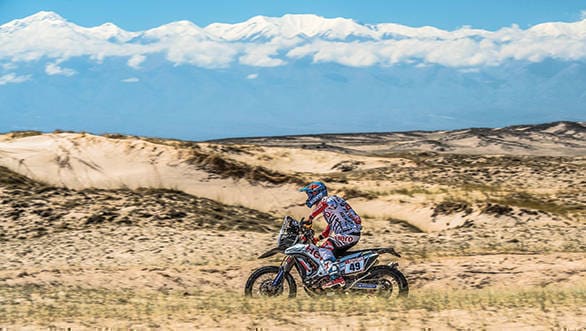 Mountains in the background, but no time to stop and enjoy the scenery, of course, for CS Santosh.
Mountains in the background, but no time to stop and enjoy the scenery, of course, for CS Santosh.
Not before he's achieved that aforementioned potential, though. "My own potential in numbers?" he wonders aloud. "For a stage - top 10, top 15. Top 20 in the Dakar is like winning for someone from India. When you think about it, how deep is the talent pool here? There are 25 or 30 guys who ride dirt bikes here in India. Out of that talent pool you have this one guy who is able to make it into the top 20 in the world." And making it into the top 20, amongst motorsport champions from various parts of the world, that is commendable indeed. But if he does make it to the top 20, Santosh says it won't be because of riding skill alone. "It's not because of my skill, it's just because of what I envisioned. In terms of my skills I lack a lot, but in terms of the opportunity that I have managed to create - that's what I've utilised so far," he says after some amount of self reflection.
And this is perhaps the Dakar's biggest strength. In addition to showing you just how tough you are physically and how sharp you are mentally, it has the ability to show you exactly who you are. "It's a race that exposes the very fabric that you're made of. It holds a mirror to you," Santosh says. Which is why, he tells me again, the thought that he gave up, is something that doesn't sit well with him. That being said, he is happy to accept the highs with the lows, because "it makes for a good story. That's what I keep telling myself," he laughs.
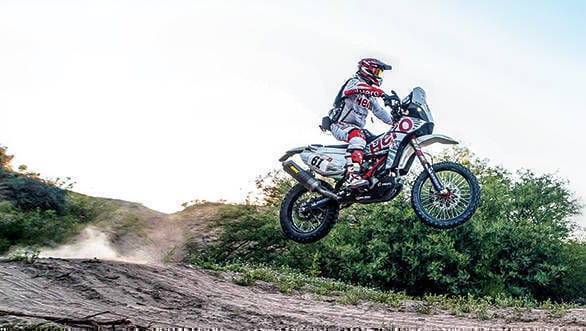 Here, once again, is Oriol Mena. This time leaping his way to that seventh place finish at the event.
Here, once again, is Oriol Mena. This time leaping his way to that seventh place finish at the event.
Four years since his first Dakar, Santosh has had to evolve in several ways. He says he's had to make a slight shift in his attitude, from someone who is just grateful that he's competing in the Dakar, to someone who believes he deserves to be there. He tells me that a little ego (and selfishness) is needed since the Dakar, especially at the head of the order, is ruthless. "Motorsport athletes are a bit different from other athletes. When you think about it, it's your life on the line, it's not a point. I think the perspective is a bit different for us. You have to give everything that you have to be in a sport like the Dakar," he says.
Santosh also tells me that he has come to accept that just as nothing is guaranteed in life, nothing is guaranteed in the Dakar. "This is the most preparation I ever did in my whole life in terms of training. I had to come to terms with that - it could be over in an instant and all that training means nothing." Then he becomes slightly philosophical saying, "Nobody owes you anything. Life doesn't owe me anything. I had all those things to deal with," he says of the crashes and the mishaps that he overcame to make it to the finish line and the fears that he had to face. And while it's the uncertainty that is his biggest fear in the Dakar, in life it is, "Growing old. It scares me. Because growing old means that I might not achieve what I want to achieve."
So what is it that CS Santosh wants to achieve? "I want to prove something to myself - I've built myself up to be this guy in my head. And I want to see if I can be this guy." It's the sort of task that might take more than just a couple of Dakars to accomplish.
Check out,

